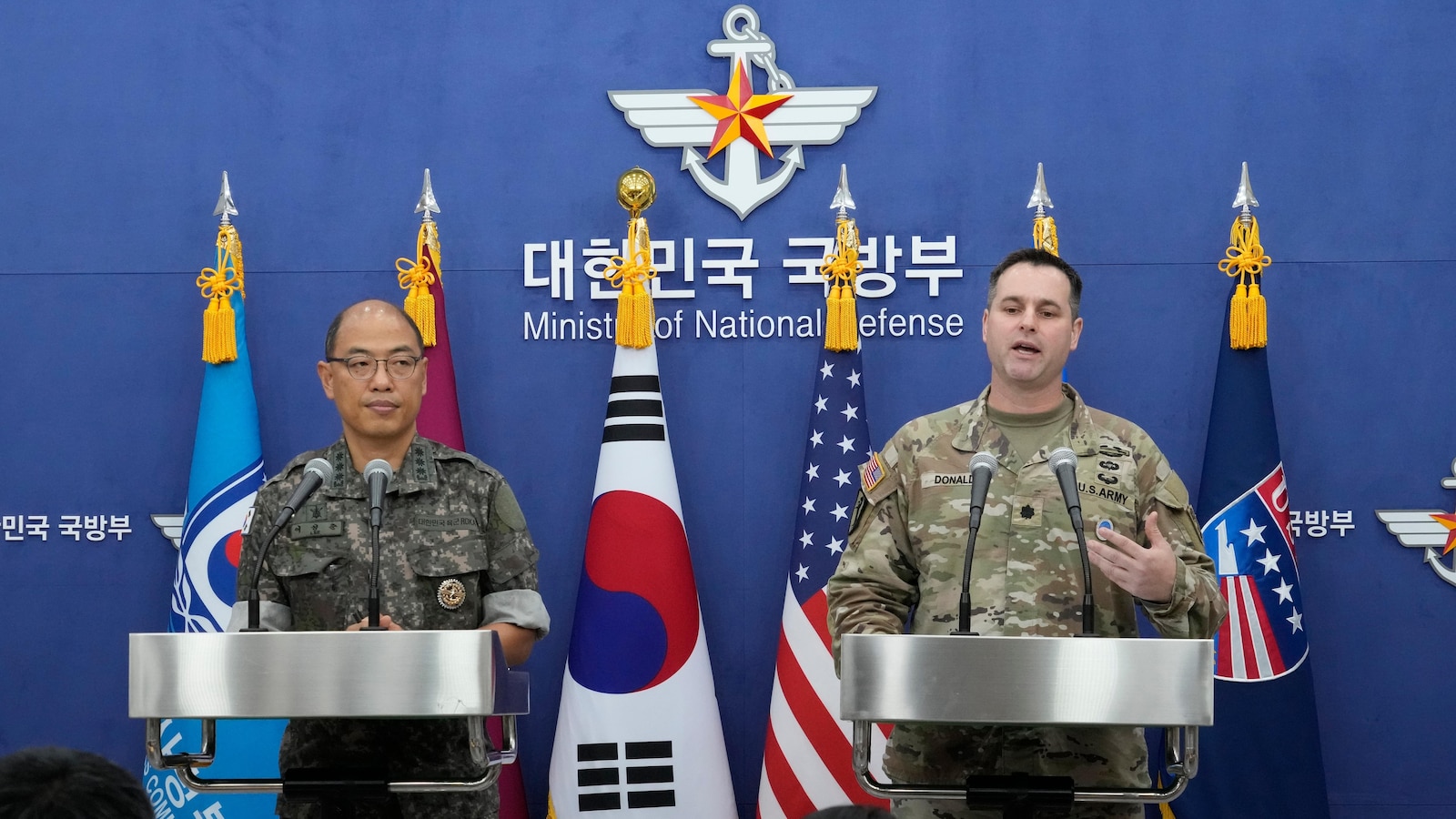
SEOUL, South Korea — South Korea and the United States will begin their annual joint military exercises next week with a focus on improving their combined capabilities to deter and defend against growing North Korean nuclear threats, the allies said Monday.
The drills could trigger a belligerent response from North Korea, which portrays them as invasion rehearsals and have used the allies’ military cooperation as a pretext to advance the development of nuclear weapons and missile systems.
South Korean and U.S. military officials said this year’s Ulchi Freedom Shield exercise, scheduled for Aug. 19-29, will include computer-simulated exercises designed to enhance readiness against such threats as missiles, GPS jamming and cyberattacks, and concurrent field maneuvers and live-fire exercises.
The allies in particular aim to “further strengthen (their) capability and posture to deter and defend against weapons of mass destruction,” military officials said in a joint news conference.
Lee Sung Joon, spokesperson of South Korea’s Joint Chiefs of Staff, said about 19,000 South Korean troops will participate in the drills, which he described as an “essential element for maintaining a strong defense posture to protect the Republic of Korea,” using South Korea’s formal name.
Col. Ryan Donald, spokesperson of U.S Forces Korea, didn’t comment on the number of U.S. troops participating in the exercises and said he couldn’t immediately confirm whether the drills will involve U.S. strategic assets. The United States in recent months has increased its regional deployment of long-range bombers, submarines and aircraft carrier strike groups to train with South Korean and Japanese assets in a show of force against the North.
“This exercise will reflect realistic threats across all domains such as the Democratic People’s Republic of Korea’s missile threats and we will take in lessons learned from recent armed conflicts,” Donald said, invoking the North’s formal name.
“ROK and U.S. units will execute combined field training exercises across all domains. Field maneuver and live fire exercises will strengthen the alliance’s interoperability while showcasing our combined capabilities and resolve,” he said.
In addition to its military exercises with the United States, the South Korean military will support the country’s civil defense and evacuation drills on Aug. 19-22, which will include programs based on North Korean nuclear attack scenarios, Lee said.
Animosity on the Korean Peninsula is high, as North Korean leader Kim Jong Un continues to use Russia’s war on Ukraine as a window to accelerate weapons development while issuing verbal threats of nuclear conflict toward Washington and Seoul.
In response, South Korea, the United States and Japan have been expanding their combined military exercises and sharpening their nuclear deterrence strategies built around U.S. strategic assets.
During last year’s Ulchi Freedom Shield exercises, North Korea conducted ballistic missile tests that it described as simulating “scorched earth” nuclear strikes on South Korean targets.
The North in recent weeks has also flown thousands of balloons carrying trash toward the South in a bizarre psychological warfare campaign that has further deteriorated relations between the war-divided rivals.
Trash from at least one of those balloons fell on the South Korean presidential compound last month, raising worries about the vulnerability of key South Korean facilities. The balloon contained no dangerous material and no one was hurt.
South Korea and the United States are set to begin joint military exercises next week in response to ongoing threats from North Korea. The annual drills, known as the Ulchi Freedom Guardian exercise, are scheduled to take place from August 16 to 26 and will involve tens of thousands of troops from both countries.
The decision to move forward with the exercises comes amid heightened tensions on the Korean Peninsula, with North Korea continuing to test ballistic missiles and make bellicose threats against its neighbors and the United States. The exercises are seen as a way to demonstrate the strong military alliance between South Korea and the US and to deter any potential aggression from North Korea.
The Ulchi Freedom Guardian exercise is a computer-simulated war game that focuses on defending South Korea from a North Korean invasion. It involves a variety of scenarios, including cyber attacks, missile launches, and other forms of aggression. The drills are designed to improve coordination and communication between the two countries’ militaries and to ensure that they are prepared to respond effectively to any threats.
While the exercises are routine and have been conducted for many years, they have taken on added significance in recent months as tensions on the Korean Peninsula have escalated. North Korea’s continued missile tests and threats of nuclear war have raised concerns about the possibility of a conflict breaking out, and the joint military exercises are seen as a way to show strength and resolve in the face of these threats.
Both South Korea and the United States have emphasized that the exercises are defensive in nature and are not intended to provoke North Korea. However, Pyongyang has condemned the drills as a rehearsal for an invasion and has warned that they could lead to a dangerous escalation of tensions.
Despite North Korea’s objections, the joint military exercises are expected to proceed as planned next week. The two countries have reaffirmed their commitment to maintaining a strong defense posture in the region and to standing united against any threats from North Korea.
In addition to the Ulchi Freedom Guardian exercise, South Korea and the US also conduct other joint military drills throughout the year, including the Key Resolve exercise in the spring and the Foal Eagle exercise in the fall. These exercises are an important part of the alliance between the two countries and help to ensure that they are prepared to respond effectively to any potential threats.
As tensions on the Korean Peninsula continue to simmer, the joint military exercises between South Korea and the United States serve as a reminder of their shared commitment to security and stability in the region. By working together to strengthen their defense capabilities, the two countries are sending a clear message to North Korea that any aggression will be met with a strong and unified response.


